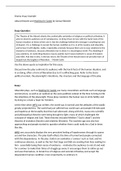Drama essay example
Absurd theatre and Waiting for Godot by Samuel Beckett
Essay Question:
The Theatre of the Absurd attacks the comfortable certainties of religious or political orthodoxy. It
aims to shock its audience out of complacency, to bring it face to face with the harsh facts of the
human situation as these writers see it. But the challenge behind this message is anything but one
of despair. It is a challenge to accept the human condition as it is, in all its mystery and absurdity,
and to bear it with dignity, nobly, responsibly, precisely because there are no easy solutions to the
mysteries of existence, because ultimately man is alone in a meaningless world. The shedding of
easy solutions, of comforting illusions may be painful, but it leaves behind it a sense of freedom
and relief. And that Is why, in the last resort, the Theatre of the Absurd does not provoke tears of
despair but the laughter of liberation. – Martin Esslin
Use the above quote as inspiration for this essay.
Discuss how the play confronts its audience with the harsh facts of the human situation, and
in so doing, offers a form of liberation due to it’s unflinching gaze. Refer to the Socio-
political context, the playwright’s intentions, the structure and the language of the play.
Essay:
Absurdist plays, such as Waiting for Godot use many conventions and tools such as language
and structure, as well as an outlook on the socio-political context of the time to bring to life
the intentions of the playwright. These plays condemn the human race in all its futility and
by doing so; create a hope for freedom.
At the time when WFG was written, the world was in turmoil and the attitudes of the public
greatly projected this. The world had just suffered two world wars and people felt betrayed
and hopeless at the brutality that they had witnessed. Along with this, many new scientific
and philosophical theories were being brought to light, many of which challenged the
concepts of religion and God. These theories included Nihilism (“God is dead”) and the
theories of evolution (Darwin) and relativity (Einstein). The machine age was also fast
approaching and people started to question whether there could really be a God in times
like this.
WFG very accurately displays the very prevalent feeling of hopelessness through its sparse
set and few characters. The play itself reflects the time of turmoil and people connected
with this despondency. In the play, Godot can symbolize a ‘saviour’ such as God, and his
continuous absence, as well as the fact that Gogo and Didi are wasting their lives waiting for
him - essentially losing their sense of existence – motivates the audience to not sit and wait
for a saviour to make their times of struggle go away. It encourages them to rather go out
and save themselves, to break free of religious and societal orthodoxy and accept the
despondent human condition; more importantly, to embrace it.




